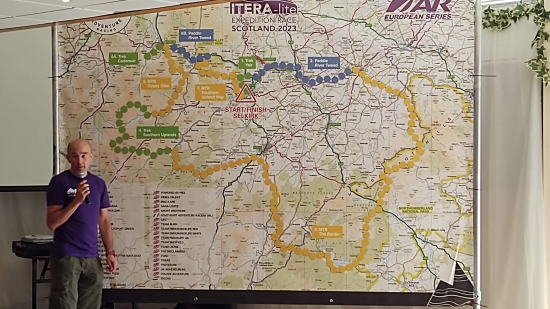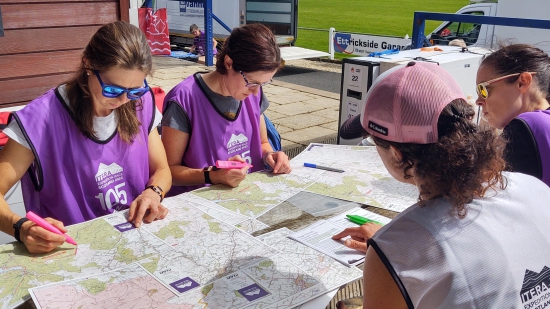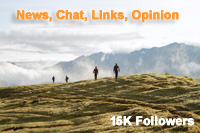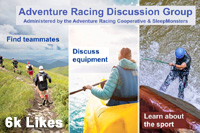ITERA Lite in the Southern Uplands - A Long Weekend of Adventure
Rob Howard / 28.07.2023


Teams have assembled at the Selkirk Rugby Club in the Scottish Borders for ITERA-Lite, ready to start the 345km AR World Series Europe Race. Durty Events are hosting the race, having taken on the ITERA brand, and they plan to bring the full ARWS Expedition race back in 2025. This year and next ITERA-Lite, the ‘little brother of ITERA’, will offer teams a shorter race but still a big challenge with the expedition race feel of ITERA. There will still be long stages, and ‘trouser-filler’ special challenges and the course planner is the same, former World Champion Tom Gibbs.
Before arriving teams already knew there would be 8 stages and the discipline and estimated timings for each. The fastest predicted time is around 40 hours (but that is without sleep, accounting for bad weather or the time for transitions) and as the race starts at 4pm every team will race through 2 full nights. It’s more than a weekend race and is the longest event in the ARWS Europe Series.
Registration opened at 9am and many teams were already camped around the rugby field, having arrived last night. On the far side of the field a double row of camper vans was parked up, packed with a vast amount of outdoor gear, which was spread out around the vehicles through the morning as bike and gear boxes were packed up ready to deliver to the race crew. There were a few showers through the morning which made life more difficult, but they didn’t last long.
At registration the purple race bibs and team trackers were given out and all of the team photos taken. Free Barrier Balm and Chain lube from Squirt Cycling Products were available to pick up as well, and teams may make good use of them.
The race is for teams of four and pairs, and there were a mix of accents in club house; Scottish and English, there is a strong Irish contingent, and there are French and Dutch teams as well, plus one racer who has travelled all the way from New Zealand to race with his brother.
The Swedish team are Karlstad Multisport Green and Ida Svensson said, “We are quite an experienced team and have raced The Beast in Ireland and Expedition Africa, and our navigator Magnus has raced many World Champs. We are here because the race is in our holiday time and it’s not too hot, and we can stay for a week and go on tour. We don’t expect to go fast and be competitive, we want to have a fun time.”
Magnus Svensson added, “We are looking forward to seeing the Scottish lowlands and I hope the navigation on the open hills will be similar to that in the Swedish mountains.”
Agneta Gustavsson is new to the team and in her first adventure race and said she felt very nervous, but Ida reassured her “It will all be fine!”

She is one of many racers in their first adventure race, or first their long, overnight race. There are a few late replacements here and one is Richard Haynes, who joined the experienced Endurancelife Celts team with 2 days notice. He is a friend of Gary Davies and when Nicola McLeod was injured he stepped up. “I live in Cornwall,” he said, “and had just returned from holiday in Scotland. Then I had to pack, drive to Wales to pick Gary up, and come back to Scotland! I’ve done The Heb before (The 2 day Durty Events stage race in the Outer Hebrides) and lots of mountain biking, but never a big adventure race like this.”
Emma Hughes was another late replacement, joining the very experienced all female Irish team ‘Keep her lit’. The team has two racers from N. Ireland and two from the Republic. Another Emma (Craig) joined Rebel Talent as a late replacement and is in her first race. The team were delighted to find her parents live close to the start and they could stay there instead of camping!
At the other end of the experience scale there are members of the Endurancelife and UK Adventurers teams who have competed in many ARWS Expedition races and there many competitors who have raced most or all of the past ITERA expedition races. One pair with both an age and experience difference is Eco Trail Wicklow. Paul Mahon (who runs the Eco-Trail race) is a veteran of Irish adventure racing and laughed when he said race partner Johan Muller was “half his age, and I’m older than his mother!” The pair has raced together before and Paul added, “A shorter race which is easy to get to was a big appeal, and being able to race as a pair. It’s a lot less organising and I don’t enjoy that bit of racing.”
At 12.00 it was time for the big course reveal and once again ITERA had prepared a huge overview map to unveil to the racers. When the curtain fell they discovered they will be riding across the border into England, and into the Keilder Forest. This is part of the 175km ride, which goes over the Cheviot Hills and is broken up by two special stages. These are ropes activities at the Calvert Trust centre in Kielder, and an abseil from the Shankend viaduct.
Introducing the course, Gibbs emphasised how wild and remote the main part of the race is, saying, “the ride is 90% on forest tracks and trails and there is only one shop on the first two days of the race, which may not be open. Teams will feel very alone and see few people.”
The 40km trekking stage in the Southern Uplands will be tough too (the fastest predicted time is 10 hours) and the navigation will be challenging.
The race finishes with a paddle on the upper Tweed river, which is a beautiful stretch of water, and a final mountain bike stage on the trails between Innerleithen and Selkirk. The area is a mountain bike hub with some world renowned trails and is hosting a UCI World Cup event this weekend. (Teams won’t be on those trails.) The leaders are expected back in Selkirk on Sunday morning and teams have until 10 am Monday to finish.
Almost all of the checkpoints are optional, so those watching the tracking should expect to see some very different routes taken. Gibbs thinks about a third of the teams might succeed in getting them all and complete the full course. The rest have to decide on the best route for their speed and abilities, and how hard they want to push.
The actions starts at 4pm and it’s a 15 minute walk to the start line. From there teams have an hour long trek and then paddle into the night along the Lower Tweed to Kelso. After that they start the long bike stage and head into the wilderness.








 SleepMonsters
SleepMonsters



